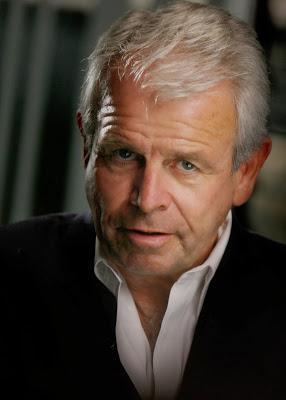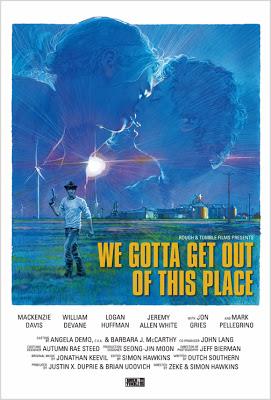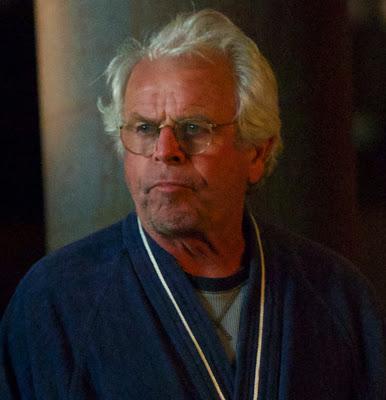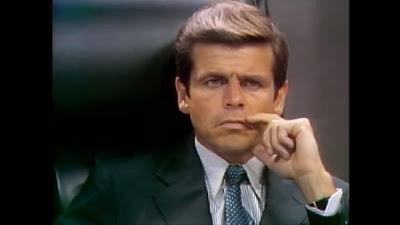
WILLIAM DEVANE RESPECTS THE TEXT
By
Alex Simon
Few actors ruled the big and small screen with such vigor during the 1970s as William Devane. Using his classically handsome Irish features to embody parts best described as “Ivy League menace,” Devane hasn’t stopped working since making his film debut in 1967. McCabe & Mrs. Miller, The Missiles of October, Marathon Man, Family Plot, Rolling Thunder, Yanks and Testament are just a few of the classic titles to which Devane brought his unique brand of charisma. The ‘80s saw him dominating the airwaves on the primetime soap Knots Landing as the nefarious Gregory Sumner, with dozens more memorable turns to follow.
Devane lends his gravitas to the new indie thriller We Gotta Get Out of This Place, a nifty neo-noir about a group of Texas teens (Mackenzie Davis, Logan Huffman, Jeremy Alan White) from a dead-end town who find themselves over their heads when one rips off a local gangster (Mark Pellegrino). Devane plays the almost mythical mob boss whose extended cameo at the film’s climax has to be seen to be believed. Written by Dutch Southern, directed by Simon Hawkins and Zeke Hawkins, and produced by Brian Udovich and Justin X. Duprie, the Rough & Tumble Films production had its world premiere at the Toronto Film Festival and makes its American bow at tonight’s AFI Fest in Los Angeles.
William Devane sat down with me recently to discuss his remarkable career.

We Gotta Get Out of This Place really pays homage to the great, gritty thrillers of the ‘70s. Is that what drew you to it?
William Devane: Definitely. The material is what draws me to the project. I was knocked out by it. It’s a quintessentially American picture, like Bonnie & Clyde. And they really don’t make pictures like that anymore, and if it weren’t for kids like this, they wouldn’t get made at all.
I thought your choice of wardrobe, a bathrobe, was inspired.
I thought about it a lot. I live out in the desert, in farm country. I’m around a lot of farmers, guys with packing houses, that sort of thing. Half the time, these guys are in their pajamas or in their slippers. It’s their place. I didn’t think it would be appropriate for William Devane, dressed as Gregory Sumner, to come through the door. That would be somebody else. These are guys who don’t even think about being rich. If they were playing Monopoly, they’d still make all the right moves.
 Devane as "Big Red" in We Gotta Get Out of This Place.
Devane as "Big Red" in We Gotta Get Out of This Place. I also loved how emotionally detached he was throughout the entire scene. He never raised his voice.
No, didn’t have to. He knows who he is. He wants his money. “Where’s my money?” (laughs)
You were born and raised in upstate New York.
Yeah, in Albany. I moved to the city when I was 17.
Your father was Franklin Delano Roosevelt’s driver.
When he was governor, yeah. I never got to meet him. It was just before my time. Then he drove the state controller, Arthur Levitt, for most of his life. My brother, sister and I spent our lives running around the aisles of the capitol building.
What about growing up in Albany drew you to acting?
Joey, my older brother, had his own TV show in the ‘50s, along with Cathy Callahan. It was a local kid’s show called Teenage Barn. They’d be on Saturday morning. “Side by Side,” was their theme song. Then they’d perform at schools and banquets all over town. They had drag little Willie along and that’s how it happened. I spent my childhood watching this and suddenly you start to become a part of it.
Most actors I’ve spoken with from your generation seem to have had a collective revelation when they saw Marlon Brando and James Dean for the first time.
Oh yeah. I remember when I got my first red jacket, like Dean wore in Rebel Without a Cause. I was working at a place called The Greeks, which was the place we all hung out as teenagers. I had a great car, too: a ’37 Ford Coupe. My uncle was a sergeant on the police force. Whenever they’d tow a car in, after a certain amount of time, they could move it. We were always looking for that ’49 Merc, like Dean drove in the movie, but then I saw this car. It had a back seat, and a V-8 60 in it. It was like a gangster car. (laughs)
Throughout the sixties, you did a lot of theater in New York, then got your first break in films with a small, but important part, in Robert Altman’s McCabe & Mrs. Miller.
Mostly what I remember is that Altman and Warren Beatty came to see me in a play called MacBird, which was a satire about the Johnson administration, where I played Bobby Kennedy. Altman wanted to make a movie of it, but it fell apart. Too controversial. That’s when they hired me for McCabe. We shot in Vancouver, which started the whole Vancouver filming trend. There was a modern housing development right across the street from the town set. The production office was one of the houses that hadn’t sold yet. We’d all go to watch rushes every night, everyone smoking a lot of weed.
What was Altman like as a director?
He was terrific, a television guy. Bob was all about “get it done.” Warren was the maniac. He’d want to do take after take. Bob would just go home: “I like take 26 and 27. See you in the morning.” (laughs) Warren would stay there by himself and just keep re-shooting. Half the cast lived in that little town we built. They had this whole society going and Bob encouraged that sort of behavior.
 Devane as John Fitzgerald Kennedy in The Missiles of October.
Devane as John Fitzgerald Kennedy in The Missiles of October. The role that really made you was JFK in the TV movie The Missiles of October. With the 50th anniversary of JFK’s death approaching, people are bringing up this film quite a bit.
Yeah, that’s the part that really made me. I joke that before I played JFK, I was third guy through the door on Mission: Impossible. (laughs) They originally wanted me to play Bobby. Martin Sheen was going to play Bobby Kennedy if Hal Holbrook played JFK. If Hal didn’t do it, Marty didn’t want to do Bobby. I knew the director, Anthony Page, from the New York Shakespeare Festival. So I’m there, thinking I’m going to play Bobby, and they can’t find anyone who will play JFK. This is 1974, so people are afraid of being typecast. They decided to hire me and the network responded “Who the fuck is William Devane? Are you nuts?” (laughs) So I thought that was it. That night, it so happened, a TV movie I was in, directed by Stanley Kramer, was on, called Judgment: The Court-Martial of the Tiger of Malaya, about General Tomoyuki Yamashita. I played the defense attorney. One of the network guys happened to watch it, liked what he saw, and suddenly I was back in. That was it.
Tell me about your interpretation of JFK. I understand you actually wore a back brace during rehearsals and during the shoot.
I’m an Irish-American and I grew up in an Irish-American neighborhood. So one, it’s an honor to play the guy, but from the point of view of my background, it’s an incredible responsibility. I’m not even thinking Hollywood or acting. I’m thinking I’d better get this right so I can go back home to my local bar and have a fuckin’ beer. So I left my family in the Valley and I rented a hotel suite in Century City and prepared there. I covered the walls with photos of JFK. I wore the back brace. I walked with a book on my head. I did all those exercises daily. My friend John Pleshette taught me the Boston accent during MacBird. We would take the train down together to the Village for the show every night and (Boston accent) would, uh, talk on the, uh, train every night as the, uh, brothers. I never worked harder on a part, ever. And we did it like a play.
But you definitely brought your own sensibility to it. You weren’t doing a Vaughn Meader impression.
Yeah. Anthony Page kept telling me to play Katharine Hepburn, because he felt I was more of an alpha male, whereas JFK had a strong feminine side, especially compared to Bobby. So it was an amazing production. And the great thing was, since most of the actors were out of Joe Papp’s company, I was carrying spears behind most of these actors on stage just a few years before, and here I was playing the President to their cabinet members! (laughs)
A few years later you worked on Alfred Hitchcock’s final film, Family Plot. What was that like?
I replaced Roy Thinnes on that. He worked five weeks and just didn’t get along with Hitch. It was fun. You come into something five weeks in the middle of the shoot, and it can be awkward, but I liked Hitch. He was a heavy drinker, so he would fall asleep in the afternoon between takes. (laughs) He loved Barbara Harris and I always hung around with Barbara. He’d always tell her great stories.
It sounds like he was more comfortable around women.
Yeah, he certainly migrated to them, although he didn’t like Karen Black. She was always in conflict with Hitch.
She was probably too sixties and Method in her sensibility for him.
Yeah, she wouldn’t like some of the lines and wouldn’t say them, and that would drive Hitch up the wall. She’d argue over exposition. She’d say “I wouldn’t say that.” He’d reply, “Yes, you would. It says so in the script.” Sometimes I’d say to him, just to ease the conflict between him and Karen, “Hitch, I could work that line in.” He said, “Roll!” (laughs) Again, he was a guy who just wanted to get it done. The key is, the most successful guys understand text. I don’t give a shit what their mask is about Method acting, whatever. If you don’t understand material, you’re going under. I worked with Matthew McConaughey recently on Christopher Nolan’s new picture, and I was telling him the fabulous choices he’s made over the past few years. He’s doing movies like Mud that cost 98 cents and are shot in a month. And it’s one of the best pictures of the year. Most actors aren’t making movies like Mud, because they don’t understand the material. Which gets us back to these guys who made We Gotta Get Out of This Place. It’s good material. There are a couple actors in it who are just fabulous, especially the woman, Mackenzie Davis. She’s terrific, a movie star.
I know a lot of veteran actors don’t necessarily love working with first-time filmmakers, but that wasn’t the case on this.
No, Simon and Zeke were very collaborative, very open, they didn’t fall into a lot of the traps that young, independent filmmakers do, which is basically not trusting your cast. I worked on a movie about ten years ago, which will remain nameless, written and directed by some young kids, first-timers, and they were so arrogant. We couldn’t touch one word of their script or disagree with their direction. And they put together an amazing cast who had over a hundred years of acting experience among them, to their one year. And they couldn’t pay attention to anything we said?
One of my favorite movies of all-time is Marathon Man. I revisited the book recently and had forgotten that your character and Roy Scheider’s were clearly lovers in the book, whereas in the movie, it was very subtly implied.
And what’s funny is that (director) John Schlesigner, who was openly gay, never even mentioned it to us. John was really cool, the best. The one thing he wasn’t was heavy-handed. I did three pictures with him and we were very good friends. He lived down in the desert and my wife and I would see him a lot. I was rubbing his feet in the hospital a day or two before he passed. John had a big set of nuts and we had more goddamn fun. But with Marathon Man, it was a picture that was driven by a guy like Dustin (Hoffman). That takes the whole thing to a different level. Plus it was written by one of the great screenwriters, William Goldman, and then Dustin brought Robert Towne in to write the end, without telling Olivier. My brother Joe was Olivier’s driver.
What was your experience with Olivier like?
It was great. We both knew our lines. (laughs) Now Dustin wanted him to learn his lines and then give him new lines. It was a way of breaking him down. Dustin told me a story when he and Steve McQueen did Papillion. They’d be sitting around and McQueen would get a reefer going and get Dustin off his game, at least that’s the way Dustin saw it. His justification for it was, it didn’t look good because Olivier was always so locked into the text, it drained some of the life that could have been there in the scene. By changing the text and getting him in a more improvisational approach to the scene, it gave him a little more humanity. I think that’s why Dustin did it that way.
Rolling Thunder was one of those movies that blew the back of my head off the first time I saw it.
Yeah, it was a trippy movie. They really blew it the way they tried to release it, wound up putting it right into the toilet. It was previewed in the wrong place, in San Jose. There were a lot of Mexican-Americans in the audience who, wrongly in my opinion, felt it was racist and they went nuts, setting fire to the seats of the theater. It panicked 20th Century Fox and they just dumped it.
How was Paul Schrader’s draft different from what Heywood Gould eventually wrote?
A lot of it wasn’t accessible, and that’s what Heywood did with it. “You gotta learn to love it,” that kind of stuff was all Heywood. (Director) John Flynn was a big fan of John Sturges, Robert Aldrich, Don Siegel and the French guys, like Jean-Pierre Melville. These guys made “pulp” movies, but they were actually much more if you read between the lines. John was Robert Wise’s first A.D. and knew his way around that room, but didn’t know how to play politics upstairs. If he had, he would’ve made a bunch more great pictures. You see, my job is to work with directors who view their job as being interested in what’s not being said. John was one of those guys.
And this is why Rolling Thunder is my favorite performance of yours. You have, maybe, 30 lines of dialog in the entire 95 minute movie. Your performance is almost entirely internal.
Yeah, that’s why it’s one of my favorites, too.
Your co-star was an unknown named Tommy Lee Jones. And he had even less dialog than you. Could you see he was going places then?
Yeah, Tommy was terrific. Going places is about business, though, and not acting. Tommy is all business. He knows what he’s doing. He’s another guy who understands material, very smart. We got along pretty good when we were there. When you look at that film, all those years ago, we’re in the same place again: we’ve got guys coming back from war who are trained to kill. They ain’t lookin’ to be a short order cook. They’re lookin’ to fuckin’ kill somebody, because that’s what they’ve been trained to do. I thought Tommy really captured that whole aspect of his character.
You did a movie in the early ‘80s that really affected me, called Testament, about the aftermath of a nuclear attack.
I shot yesterday on Chris Nolan’s new movie. One of the grips came up to me and said that he’d worked with me on Testament. And we both agreed we couldn’t watch the movie. It’s so dark. It was great working with Jane Alexander. We were friends from New York.
Since Knots Landing in the ‘80s, TV has been your bread and butter. What’s the difference for you between working in film and working on television?
I like working fast, but I got to the age where the real difference between television and the movies is, I’m not smart enough to be in the movies. It’s a very political world. In all modesty I can say that I’m a much better actor, but that doesn’t matter. When I speak to kids in schools, I tell them there’s a thousand of you standing right here and there are a hundred parts. Next year, there’s gonna be a hundred of you left and ten parts. And the following year, there are gonna be ten of you and one part, and only one of you is gonna get it. What does this have to do with acting? Nothing. If I were you, I would leave here, go to the Harvard Business School and then come back. Because it’s the guy who gets the part who’s thought of as being the best actor. So no matter what happens, someone like Tom Cruise is the smartest guy, regardless of whether you like his work or not. I was trying to tell this to Matthew McConaughey the other day: you get that career moving along, you’ve got $100 million in the bank and you start to make these choices that say “This is who I am.”
